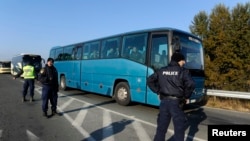Greek police on Wednesday loaded hundreds of migrants who have been stranded for three weeks at the Macedonian border onto buses bound for Athens, a police official and a Reuters witness said, ending their hopes of reaching northern Europe.
Scuffles broke out but not on the scale of recent clashes between police and the roughly 1,200 people - mostly men from Pakistan, Morocco and Iran - stuck near the town of Idomeni, after Macedonia began filtering migrants by nationality.
Some 30 men resisted police and were taken to a police station but were later put on the Athens-bound buses as well.
At the other end of the country, 12 migrants drowned when their boat sank off the small Greek island of Farmakonisi, close to Turkey, in the early hours of Wednesday, a coastguard official said, while 26 were rescued and 12 more were missing.
The U.N. refugee agency said those rescued included a 7-year-old child both of whose parents were missing. Six other children were among those drowned.
Migrants continue to attempt the perilous crossing despite the onset of winter weather, mounting obstacles in Europe and increased efforts by Turkey to crack down on people smugglers.
Hundreds of thousands of people have streamed into Europe this year, mostly through Greece. Balkan states began blocking passage last month to all but Syrians, Iraqis and Afghans, who are considered as refugees because they are fleeing war zones.
Some of those stranded near Idomeni began hunger strikes and a handful sewed their lips shut to dramatize their demands. A Moroccan man was electrocuted to death last week on a railway line which the migrants had been blocking. Another was seriously burned when he climbed on top of a train to try to cross the border.
The police official said the migrants would be taken to migration centers in the Athens area before being sent home.
Another police source said some would be housed at a sports hall used for taekwondo during the 2004 Olympic Games.
Macedonia has erected a metal fence to keep unwanted migrants out and plans to extend it to cover more than 40 km (25 miles) of the border.
More than 600,000 people have arrived in Greece this year making the short but perilous journey by boat or rubber dinghy from Turkey to outlying islands. Thousands more have drowned.
Six Afghan children died on Tuesday after their boat capsized off the coastal Turkish city of Izmir. Worsening weather and dropping temperatures have failed to deter some trying to reach Europe.
Turkey has vowed to do more to stop the flow, after signing a deal with the European Union on Nov. 29 under which it will receive 3 billion euros ($3.3 billion) in aid to improve conditions for the 2.2 million Syrians Ankara has been hosting.
The EU deal also pledges easier visas for Turks visiting Europe and expanded talks in its long-stalled negotiations to join the 28-nation bloc.





